Prose
After thirty years
Issue 1/1987 | Archives online, Fiction, Prose
This, the very first Finnish science fiction story, is an extract from Viktor Pettersson’s (1849-1919) Efter trettio år (‘After thirty years’), published in 1886. Introduction by Matti Apunen
On 31 August 1916 father and daughter went up on the ‘deck’ of the air balloon Atlantic. Atlantic was just one of the comfortably furnished air vehicles that plied the regular route between the New and Old Worlds. Pleasure trips between these continents were now made, preferably, by air balloon rather than by ship, because the journey took half the time – a mere three days; and this despite the fact that the standards of comfort in ships were now excellent, since they were made of cardboard and furnished with electric motors. In addition, air balloon travellers avoided sea-sickness and the associated unpleasantnesses. Of course, they did suffer from ‘airsickness’, but the symptoms of this disease made themselves felt in a much more bearable form. For they actually made the sufferer happy, enthusiastic and friendly, so that he wanted to embrace the Lord and the whole world. Dried-up and creaky old bachelors became as lovable and sympathetic as confessors who have made their vow of celibacy; spiteful and pompous wives and spice-selling madames smelling of wormwood became in a second as devoted and sweet-natured as a mademoiselle in a shop selling drinking water. It was like being under the influence of some wonderful aphrodisiac. More…
In the starry heavens
Issue 1/1987 | Archives online, Fiction, Prose
An extract from Tähtien tarhoissa (‘In the starry heavens’, 1912). Introduction by Matti Apunen
The sun sank and the evening began to draw in. It was a Wednesday towards the end of October, 2140. At Teuvo’s house the electric lights were being switched on.
Teuvo lived in Helsinki on what had once been Korkeavuori Street. Now it had no particular name. It was just Street No 311, for during the course of time there had been so many new streets that it had become impossible to name them all and numbering became necessary.
Teuvo’s home was on the thirtieth storey. But of course it was not important how high up you lived, because no one used stairs. Lifts had replaced the old flights of stairs, and even they were only seldom necessary.
Every storey had an airship stop, and since everyone, even the smallest children, had a pair of wings made of fine aluminium, it was very easy to go from one floor to another without using stairs.
Teuvo looked out of the window. There was a wide space between houses. On the right hand side of the road traffic was flying towards the centre of town, on the left in the opposite direction. What a lot of people there were! He could hear the even whisper of their wings. All kinds of people, old and young, were flying along. More…
Aphorisms
Issue 4/1986 | Archives online, Fiction, Prose
Aphorisms from Pahojen henkien historia (‘A history of evil spirits’, 1986). Markku Envall’s essay on aphorism
Do not set out in the wrong mood, at the wrong moment, for the wrong place.
Learn to distinguish these from one another, for it is an impossible task.
Do not admit to changes in yourself, say rather that your associates vary.
And that your relationships are changeable. But do not say this of yourself.
Not knowing a person should not be regarded as sufficient reason for not making his acquaintance. More…
Jacob’s Dream
Issue 3/1986 | Archives online, Fiction, Prose
An extract from Hänen olivat linnut (‘Hers were the birds’, 1967). Introduction by Pirkko Alhoniemi
‘It was Jacob’s Dream, Alma.’
How could she put it so Alma wouldn’t get hurt. Alma had ruined the surface of the painting. The pastor’s widow stood nervously in front of the window and tried to say what she’d had on her mind for several days but couldn’t quite come out with. When Alma went out of the house, the pastor’s widow would wander through the rooms and check on things. And the painting wasn’t the only object in danger, but also the birds. Their feathers were ruffled because Alma kept wiping them with a wet rag. How could she put it.
‘Alma.’
Alma turned to look at her.
‘It’s called Jacob’s Dream.’ More…
The Vatican
Issue 3/1986 | Archives online, Fiction, Prose
A short story from Maan ja veden välillä (‘Between land and water’, 1955). Introduction by Pirkko Alhoniemi
At the top of the hill there was a cow barn with all kinds of trash scattered along its walls: rusty pails, pottery shards, old shoes, all the stuff country people toss onto rubbish heaps. The clucking of chickens and bleating of sheep filled the air. As I was running across the barnyard I had an idea that a chicken had probably just laid an egg on the grass or was looking for some place to lay an egg, because it was letting out such sharp scolding cries.
Many of us were running across the yard and in back of the cow barn. If I hadn’t been on my way to the Vatican I would have stayed to pat a calf that was rubbing its side against a wall of the cow barn in the glow of the rising sun. But I was in a hurry. I didn’t dare let the women out of my sight because I couldn’t find the way by myself, I couldn’t even remember exactly where I had joined the crowd. I had just seen them running by and while I hadn’t intended to start off for the Vatican just that day, I went along with them anyway. More…
Three prose poems
Issue 3/1986 | Archives online, Fiction, poetry, Prose
Prose poems from Runot ja proosarunot (‘Poems and prose poems’,1966) and Maan ja veden välillä (‘Between land and water’, 1955 ). Introduction by Pirkko Alhoniemi
Underground
I went underground, I was looking for my brother’s grave, and I saw him lying under a transparent slab of marble. His face was like gold, death had passed from it, and I knew I no longer mourned him. I came above ground. At the edge of the graveyard there was a round tower made of stone and I was high up in the top of the tower. There stood my brother in dark trousers, white shirt, looking exactly the same, in the same position as in the dim photograph someone, I don’t remember who, took of him when he was about to go fishing, hands in his pockets, head held high, he was looking up at something, not at me. And I asked him: ‘Did it hurt when the bullet went through your head, when the exploding bullet went through your head in the battle of Karhumäki, and you were still alive at the first aid station and you said something they told us about in a letter.’ He answered, ‘Yes, it did hurt.’ ‘What’s your life like now, tell me.’ I said. He raised a hand and pointed to the sky. The sky was blue, and white clouds were scudding across it. More…
The life of a lonely friend
Issue 3/1986 | Archives online, Fiction, Prose
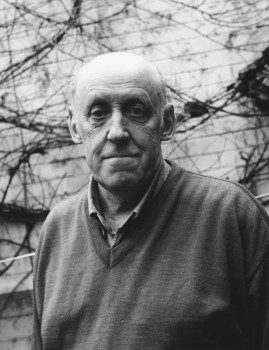
Bo Carpelan. Photo: Charlotta Boucht
Extracts from Bo Carpelan‘s novel Axel, ‘a fictional memoir’ (1986). In his preface to the novel Bo explains how he ‘found’ Axel.
Preface
In the 1930s I came across the name of Axel Carpelan (1858-1919), my paternal grandfather’s brother, in Karl Ekman’s Jean Sibelius and His Work (1935). In the bibliography, the author briefly mentions quotes from letters in the book addressed to Axel Carpelan, ‘who belonged to the Master’s most intimate circle of friends, and in musical matters was his constant confidant. Sibelius commemorated their friendship by dedicating his second symphony to him’. I had never heard Axel’s name mentioned in my own family.
Many years after Karl Ekman, the original incentive for the novel about Axel arose through Erik Tawaststjerna’s biography of Sibelius, in which Axel is portrayed in the second volume (1967) of the Finnish edition, and whose life came to an end in Part IV (1978). From early 1970s onwards, I started notes for Axel’s fictional diary from to 1919. It is not known whether Axel himself ever kept a diary. I relied as muchas possible on all the available facts. These increased when I was given access to letters exchanged between Axel and Janne from the year 1900 onwards. It became the story of the hidden strength a very lonely and sick man, and of a friendship in which the give and take both sides was far greater than Axel himself could ever have imagined.
Hagalund, June 1st, 1985
Bo Carpelan
![]()
1878, Axel’s diary
15.1.
On my twentieth birthday, I remember the young Wolfgang; ‘Little Wolfgang has no time to write because he has nothing to do. He wanders up and down the room like a dog troubled by flies’. However, that dog achieved a paradise. I have learnt yet one more piece of wisdom: ‘It is my habit to treat people as I find them; that is the most rewarding in the long run’. More…
Human Freedom
Issue 2/1986 | Archives online, Fiction, Prose
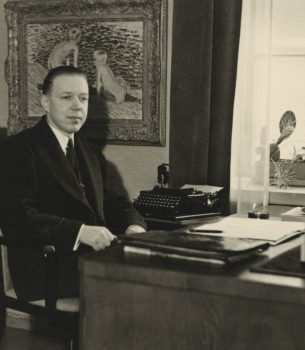
Mika Waltari. Photo: SKS Archives
Extract from lhmisen vapaus (‘Human Freedom’, 1950)
‘Where are we?’ Yvonne asked. ‘This isn’t the right street either. Somewhere between Alma and Georges V, they said. But there’s no sign of an aquarium.’
‘Talking of aquariums’, I suggested, ‘there’s a dog shop near here where they wash dogs in the back room. If you like, I’ll take you to see how they wash a dog. It’s a very soothing experience.’
‘You’re crazy’, said Yvonne.
My feelings were hurt. ‘I may sleep badly’, I admitted, ‘but I love you. I walk up and down the embankments all night. My heart aches, my brain is on fire. Then comes blissful intoxication, and for a little while I can be happy. And all you can do is to keep nagging, Gertrude.’
She wrinkled her brow, but I went on impatiently, ‘Look, Rose dear, just at present I have the whole world throbbing in my temples and in my finger-tips. Age-old poems are bubbling up within me. I am grieving for lost youth. I am boggling at the future. For just this one moment it is given to me to see life with the living eyes of a real human being. Why won’t you let me be happy?’
‘I have walked two hundred kilometres’, said a low, timid voice at my elbow. I stopped. Yvonne had stuck her arm through mine. She, too, stopped. We both looked down and saw a little man. He doffed a ragged cap and bowed. Flushed scars glowed through a grey stubble of beard. He was wearing a much-patched battle-dress from which the badges had long since disappeared. His face was wrinkled, but the little eyes were animated and sorrowful. More…
The Cheap Contractor
Issue 2/1986 | Archives online, Fiction, Prose
From Kauan kukkineet omenapuut (‘Long-blossoming apple trees’, 1982). Introduction by Arto Seppälä
The men who delivered the hot-water cylinder offered to do the installation as well. I asked how much it would be. They lolled about a bit, exchanged a few private looks, pretended to be thinking. Then one of them fired off a sum. It was three times the quotation I’d already had. They didn’t even look at the location. I told myself I wouldn’t even go to the end of the road with big-dealers like these.
The same evening I rang up ‘a little man’ and told him he could get started as soon as it suited him.
The cheap contractor turned up a couple of days later, driving an elderly van into the yard. I went out. He’d sat himself down in a garden chair near the white lilacs. The morning sun only partially reached there; so half his body was in shade, looking colder than the sunny half. More…
Six letters
Issue 1/1986 | Archives online, Fiction, Prose
From Tainaron (1985). Introduction by Soila Lehtonen
The whirr of the wheel
Letter II
I awoke in the night to sounds of rattling and tinkling from my kitchen alcove. Tainaron, as you probably know, lies within a volcanic zone. The experts say that we have now entered a period in which a great upheaval can be expected, one so devastating that it may destroy the city entirely.
But what of that? You need not imagine that it makes any difference to the Tainaronians’ way of living. The tremors during the night are forgotten, and in the dazzle of the morning, as I take my customary short cut across the market square, the open fruit-baskets glow with their honeyed haze, and the pavement underfoot is eternal again.
And in the evening I gaze at the huge Wheel of Earth, set on its hill and backed by thundercloud, with circumference, poles and axis pricked out in thousands of starry lights. The Wheel of Earth, the Wheel of Fortune… Sometimes its turning holds me fascinated, and even in my sleep I seem to hear the wheel’s unceasing hum, the voice of Tainaron itself. More…
Emotional transgressions
Issue 4/1985 | Archives online, Fiction, Prose
Three extracts from the novel Harjunpää ja rakkauden lait (‘Harjunpaa and the laws of love’). Introduction by Risto Hannula
It was a few minutes to two, and Harjunpää was still awake, lying so close to Elisa that he could feel her warmth. He kept his eyes open, staring into the night through the crack between curtains. Once again the boiler of the central heating plant started up, and the smoke began to rise like a stiff column in the cold. Another fifteen minutes had passed, and morning was a quarter of an hour closer. He squeezed his eyes shut and tried to concentrate on Elisa’s breathing and the sleepy snuffling of the girls, but his thoughts still wouldn’t leave him in peace. Inexplicably, he felt there was something wrong, that the darkness exuded some kind of threat, that he’d left something undone or had made some kind of mistake.
He swung his feet onto the floor and got up as quietly as he could. But all his care was wasted, he should have known that.
‘What’s the matter?’ Elisa asked sleepily.
‘I just can’t get to sleep.’
‘Again … ‘
‘I can’t help it. I wonder if there’s a bottle of brew left.’
‘Sure. But listen …’
Pipsa turned over in her crib, rattling the sides, groped around a bit and began to suck her pacifier so you could hear the quiet sucking noises.
‘Yeah?’
‘Maybe you could see a doctor. You could ask for some mild … ‘ More…
Among the ice floes
Issue 3/1985 | Archives online, Fiction, Prose
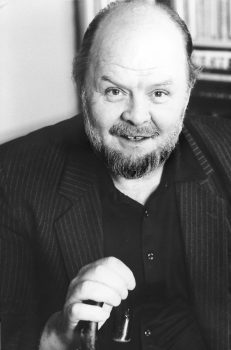
Alpo Ruuth. Photo: Sakari Majantie / Tammi
Alpo Ruuth came across the diary of a member of the Finnish crew of ten men in the Whitbread Round-the-World sailboat race of 1981-1982, and Ruuth, a sailor himself, used that diary as the basis for his novel, 158 vuorokautta (‘158 days’, 1983). It is the story of a great adventure which takes place with the help of ultra-modern equipment and yet involves confrontation with elemental nature, the dangerous power of the southern seas. Ruuth does not use the actual names of the crew, but has taken the view of the fictional crew member who is able to offer ironic comments on what he observes. The book portrays the relationships among the crew under the cramped and difficult conditions of the long voyage. As the extract begins the yacht is in the Southern Ocean, close to the Antarctic coast, making its way towards Auckland, New Zealand.
An extract from 158 vuorokautta (‘158 days’)
Around noon we run into a blizzard. On deck they shout down that a wind has got up. Below, we wake hurriedly from our afternoon naps and start pulling on clothes against the tough weather outside. It’s quite a business in our cramped quarters, and every now and then someone loses his footing and falls as the boat pitches. Cursing is the only medicine for bruises. One by one the boys go up to help change sails; at the bottom of the steps there are excesses of politeness: after you, sir; no no, after you. Up they go, all the same. More…
At the sand pit
Issue 3/1985 | Archives online, Fiction, Prose
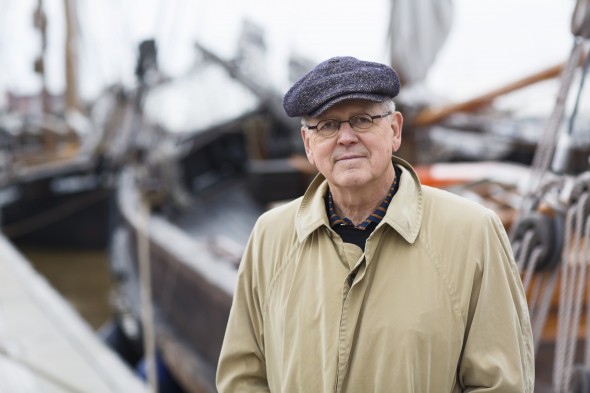
Antti Tuuri. Photo: Jouni Harala
‘After nearly 40 years of observing the Ostrobothnians, I am convinced that they have certain characteristics which explain the historical events that took place there and which also shed light on the region today. I do not know how these characteristics develop, but it appears that heredity, economic factors and even the landscape form the nature of people. Everywhere people who live in the plains are different from those who dwell in the mountains, and from those who fish the archipelagos,’ writes the author Antti Tuuri, himself an Ostrobothnian.
Antti Tuuri’s Pohjanmaa (‘Ostrobothnia’, 1982), which last January was awarded the Nordic Prize for Literature, has now been translated into each language of the Nordic countries. Tuuri’s novel describes the events of one summer day in Ostrobothnia, on the west coast of Finland, where a farming family, the Hakalas, has gathered for the reading of the will of a grandfather who emigrated to the United States in the 1920s.
The inheritance itself is insignificant, but it has brought together the four grandsons, with their wives and children. The story is narrated from the point of view of one of the brothers. The women of the family remain inside while the men take out an automatic pistol which has been kept hidden away since one of them smuggled it home from the Continuation War. The men go off to a sand pit to do some shooting and to drink some illegal home brew. There they meet their former schoolteacher, who joins in with their drinking and shooting. Some surprising events take place as the day’s action unfolds, and Tuuri’s narrator views them in an unsentimental way, describing them matter-of-factly and at times with ironic humour. The men recall the violent history of Ostrobothnia, the years of the Civil War and the right-wing Lapua movement of the 1930s.
The Nordic Prize jury commented that the novel ‘portrays the breaking up of the old society, and conflicts between generations as well as between men and women.’ Tuuri has constructed his novel on conflicts, and the result is a highly dramatic narrative.
![]()
An extract from Pohjanmaa (‘Ostrobothnia’)
A Finnish hound dog came out of the woods just beyond the sandpit, stopped at the edge of the pit and started to bark at us. The boys quickly began putting the weapon together. Veikko yelled that you were allowed to shoot a dog running loose in the woods out of hunting season. He kept asking me for cartridges; he’d shoot the dog right away, before it could tear to pieces the young game birds that couldn’t fly yet. I told him to shut up. Seppo finished putting the automatic pistol together and gave it to me. I ran to the car, put the gun down on the floor in front of the back seat and tossed a blanket over it.
When I got back, I saw the teacher coming out of the woods over by the pit. He snapped a leash on the dog and started towards us through the pine grove. The boys sat down around the campfire and began taking swigs of home brew from their cups. More…
Daughter of Cain
Issue 2/1985 | Archives online, Fiction, Prose
An extract from the novel Kainin tytär (‘Daughter of Cain’, 1984). In the following extract Anna and Risku spend a single night recalling the early days of their relationship; Anna is in the country, Risku is in the city. Introduction by Soila Lehtonen
Anna
The moon hangs before the bosom of the sky, a slender crescent, but giving light all the same.
On the horizon a black, glimmering line emerges from the water. It is the skerry, a low, lone rock.
I shut off the motor. The sea laps minutely against the side of the boat. This far out there are no longer any birds.
The silence here is deeper than even that of an empty room.
The skerry is as black and glistening as the back of a pike.
Light is matter, it’s never steady.
Whatever is understood in life is understood in a sudden blue illumination, like lightning cleaving the night to expose the landscape – shadows, hollows and all. More…
Narcissus in winter
Issue 4/1984 | Archives online, Fiction, Prose
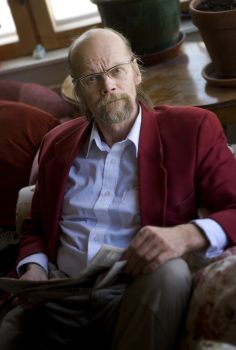
Risto Ahti. Kuva: Harri Hinkka
Poems from Narkissos talvella (‘Narcissus in winter’, 1982). Introduction by Pertti Lassila
Risto Ahti (born 1943) published his first work in 1975. His poetic expression finds form remarkably often in prose poems, and Narkissos talvella is made up exclusively of these. His poems transmute language into a mystical, surreal world, sometimes enigmatic and subjective in the extreme, and at its best strangely suggestive. It is as if Ahti’s world were in a state of constant change, subjected to a relentless process of demolition and rebuilding. The experience of the individual, generally his encounter with truth, is central to many of Ahti’s poems; the inner reality of a person manifests itself as more essential than the outward appearance. Ahti’s poems exhibit a fruitful contradiction: on the one hand, the accuracy with which he uses words and, on the other, the continual shape-changing and lack of definite boundaries of the world they describe. More…
